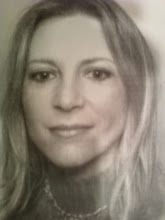I only remember already knowing the history
of the people who lived there. The house
tall, light gray, at the edge of a corner, too
close to the sidewalk, was just down the
block and a hop across the street from mine.
It held some dark history in trust, something
that was trying to get worked out. My house
had a happy porch swing and a foreboding
basement and its own history. One day a toy
gun, metal, a child's abandoned toy, small
enough to squeeze into hiding in a little palm,
had been found, along with fading postcards,
under the attic floorboards. The rafters were
musty and sixty-year old blueprints lay
discarded in the corner. My father sketched
his own grand ideas, an attic transformation,
but such plans would never have changed
what was.
Schools organized field trips to my neighbor's
house. In the house, a doctor and his wife,
polite but keeping to themselves, had famous
blood sighing and lingering for visitors. In
the cool, carpeted basement, one-hundred
year old history lay in wait: a bed, a table,
doctor things, glasses, a recreation of a scene,
letters requesting reconsideration of guilt. There
was urgency in the memory. I was a child in
the neighborhood, could yell
Trick or Treat
in October, be recognized, maybe called
by name. I was not a traipsing student out
with her class and teacher, discovering that
John Wilkes Booth lay
here and that Dr.
Samuel Mudd had been innocent, how he was
only a doctor setting a broken leg.
We entered through a side door and walked
past the kitchen on our way back in time. Mrs.
Mudd is a smiling, tolerant memory wearing an
apron. Dr. Samuel Mudd's grandson Richard was
already leading the class down the stairs,
already defending the man he had never known,
already adding twenty or so lifetime witnesses
for the defense, already convincing children
that his blood could not possibly be tainted,
it had all been a terrible mistake. At sixteen, I
sat in a courthouse and heard false allegations
against my father. Our family had to work out
getting stuck in time; had to learn, like Dr. Mudd,
to shake off shame and keep going.
The children peeked in and pushed and jostled
against one another and had to be told to stop.
Upstairs in the kitchen, the sun was shining
and Mrs. Mudd was already a grandmother. The
house was curtsying in pride, everything neat as
a pin and nice. My kitchen had a black and
white linoleum floor that got soft when I scrubbed
it; the cupboards were metal and you had to
yank to get them open; in the pantry, buntings
and coats hung motionless in cold air. Before
leaving with the class, I went to the kitchen to say
goodbye. Mrs. Mudd was tidily preparing lunch. On
the spotless counter sat a tiny television, no
bigger than a toaster. I was amazed at such luxury
and I remember thinking how unlike us are
the famous.

